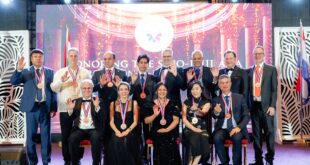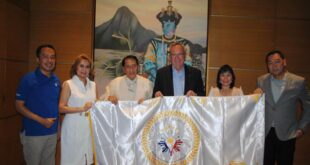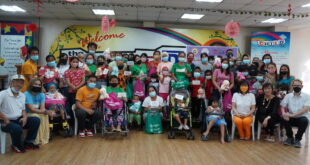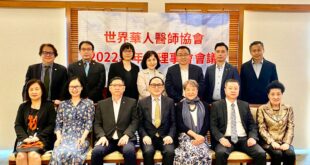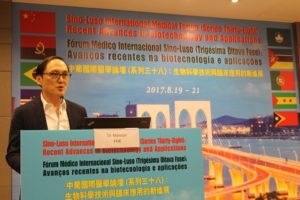
By Christopher Cottrell/ Images: Christopher Cottrell
From treating cancer with new oral medicine to harnessing nano-technology for safer doctor garb, the 38th Sino Luso International Medical Forum held this past weekend was a medical milestone moment for Macau science.
Themed “Recent Advances in Biotechnology and Applications,” the two days of seminars and workshops saw some of the brightest minds in medicine in Macau and Hong Kong present and train.
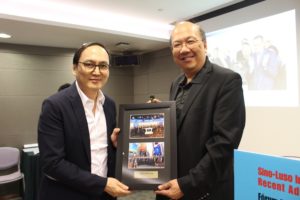
Saturday witnessed multiple power point presentations on stimulating anti-cancer treatments, as well as how new developments in nano technology for advanced filtration can help design new operation garb for doctors. Sunday witnessed workshops for Macau doctors in using fiber-optic technology for airway management.
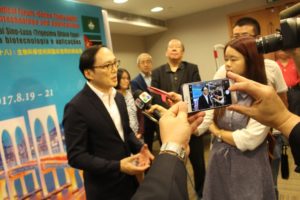
Prof. Manson Fok, President of the Sino-Luso International Medical Forum and Dean of the Faculty of Health Sciences at the Macau University of Science and Technology (MUST), said to the assembled scientists, doctors and frontline healthcare workers, “I hope you will use this occasion to stimulate the Macau people to better understand biotechnology. Not only is Hong Kong a leader in biotech, but you can show that there is a role for Macau as well. You can encourage them to think more broadly in terms of how to develop biotechnology and medical education and training. Maybe even a need for a medical school, to build a base for medical research.”
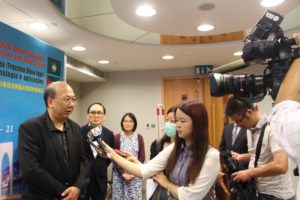
Johnson Yiu-nam Lau, Honorary Professor at the University of Hong Kong and Hong Kong Polytechnic University, said, “When you are talking about lethal diseases like MERS or SARS, having quarantine gowns for doctors and nurses is life and death.”
Prof. Lau, who is the Chief Executive Officer and Board Chairman of the recently launched NASDAQ biopharmaceutical company Athenex, noted that their work was the first time doctors from this region had developed a new cancer drug that will have a global impact—namely because it is oral and reduces the some of the negative side-effects of chemotherapy, and also can include home care.
Prof. Lau noted, “We are making cancer medicine available through oral routes, which means that there are two major advantages to this. One is that it is more effective and safer and accessible to more patients. It will also pave the way for making cancer treatments from being hospital based to maybe being home based, with long-term maintenance therapy. We’re trying to convert the process whereby cancer can be managed into a workable disease. That our treatments will be really beneficial to patients with cancer.”
Prof. Lau continued, “At the end of the day, most diseases require combination therapy. Chemotherapy today is still a key component of medical treatment and therefore it is our mission to make combination therapy.
“It was exciting because this was a combination of Asia and the U.S. together as a joint venture. Even our ownership is split between the U.S. and Asia. At the same time this is a company that got two hundred twenty five million dollars from New York State and about a hundred fifteen million dollars from the Chongqing government.
“This shows that a biotech company is getting support from two different governments at the same time. New York and Chongqing are very close right now, and we also serve as a conduit for them to talk to each other. So this is doing good for the two countries to talk and collaborate and do something to serve humanity. To have all of this in one joint venture is very exciting.”
Added Prof. Lau, “This is very exciting. I think Hong and Macau have demonstrated that these are very important developments for the treatment of diseases.
Hong Kong Polytechnic University Prof. Terence Lau said of the cancer drugs being developed by Athenex, “The developments can help people all over the world. But they are particularly important to people in Hong Kong and Macau where you do have different cancer patterns. But you know, the drug itself is not restrictive to Hong Kong and Macau. We’re just so proud that our scientists here in these tiny places can develop something that may be able to help cure diseases for all populations of the world.”
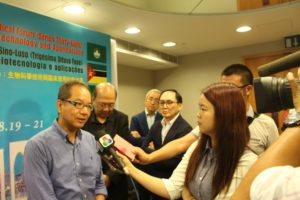
Prof. Terence Lau added, “Formulating new oral drugs to treat cancer with new combination therapy strategies, not merely chemotherapy, is ground-breaking for the region.”
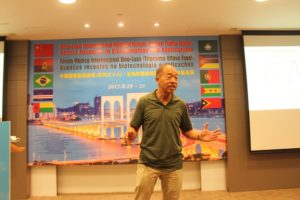
Prof. Wallace Leung of Hong Kong Polytechnic University commented, “Making people realize in Hong Kong, and potentially for Asian people, to really contribute significantly on a global scale what we are doing for cancer patients is important. I think what has been achieved over the past three or four years, not only in the science we talked about, but even in terms of our collaborations with doctor Johnson Lau, with orthopaedic and muscular developments that are translating into products, I think its been tremendous.”
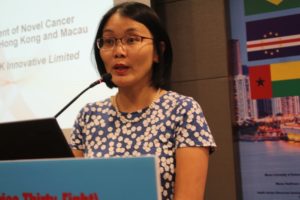
Doctor Weng-li Yoon of Hong Kong said, “Basically we are using an older drug but with a new administration, so this should reduce worries about the safety—which has been established for 30-years. What we are trying to do is actually making the drug safer instead of injecting it, you can actually orally give it to the patient. That will actually in fact reduce the side-effects further. This makes me very optimistic. Its actually quite an innovative way to do science and patient care. You are taking a good drug and giving it a good administration to the patient.”
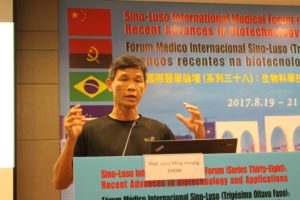
Prof. Fok noted, “This is what President Xi Jinping proclaimed publicly: to encourage Macau professionals to expand beyond gambling and promote appropriate diversification for the great importance for the interests of the people of Macau. And we are proud to say that this was the largest life sciences event we have ever done for the past 7 years.”
Vice President of Sino-Luso International Medical Forum, Dr. Billy Chan commented, “We were very encouraged and enlightened by all our experts, partners, and Macau healthcare workers.”
Dr. Chan added, “We are making major strides with our regional science and global efforts between China and the world. You can see here experts from all over the world working closely with our Macau frontline health workers. It’s exciting.”
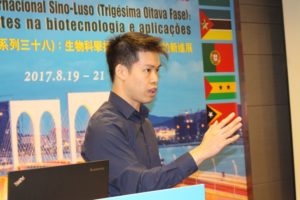
Presenters included Prof. Larry Chow, Professor, Department of Applied Biology and Chemical Technology of the Hong Kong Polytechnic University, and Prof. Wallace Leung, Chair Professor, Innovative Products & Technologies, Department of Mechanical Engineering of the Hong Kong Polytechnic University.
They also included Prof. Kelvin Yeung, Department of Orthopaedics and Traumatology, Li Ka Shing Faculty of Medicine of the University of Hong Kong, Dr. Amber Chiou, Research Assistant Professor, Department of Applied Biology and Chemical Technology, The Hong Kong Polytechnic University, and Dr. Qiubin Lin, Research Associate, School of Biomedical Science of the University of Hong Kong.
Prof. Manson Fok added, “It is a unique biotech forum based on what we have achieved in the past seven years. I am honoured to have this opportunity to work with these great minds., as well as a number of notable specialists in the life science fields, who wish to establish something here in Macau SAR.”
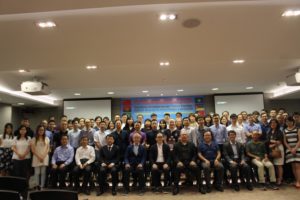
The Sino-Luso International Medical Forums were launched in 2011 in Macau and are supported by the Chinese Medical Doctors Association, the National Health and Family Planning Commission, PRC as well as a list of outstanding healthcare organizations and Portuguese speaking associations in Macau.
 Peace Post Asia Healthier News For The World
Peace Post Asia Healthier News For The World
